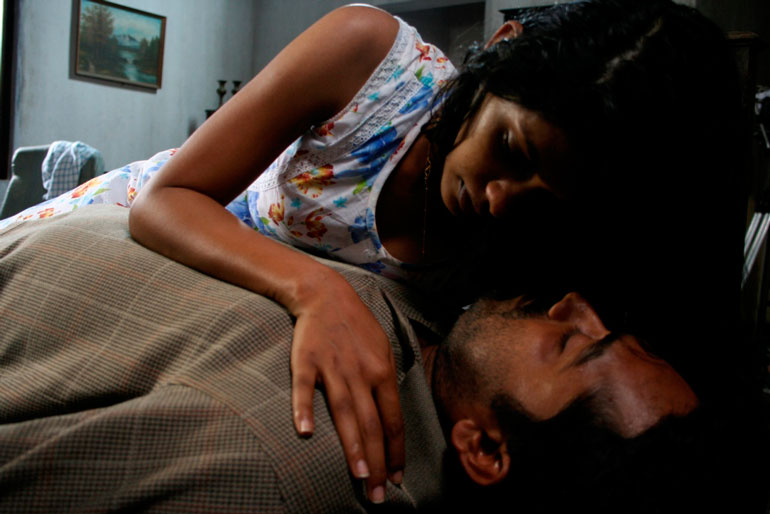Tuesday Feb 17, 2026
Tuesday Feb 17, 2026
Saturday, 10 October 2015 00:05 - - {{hitsCtrl.values.hits}}
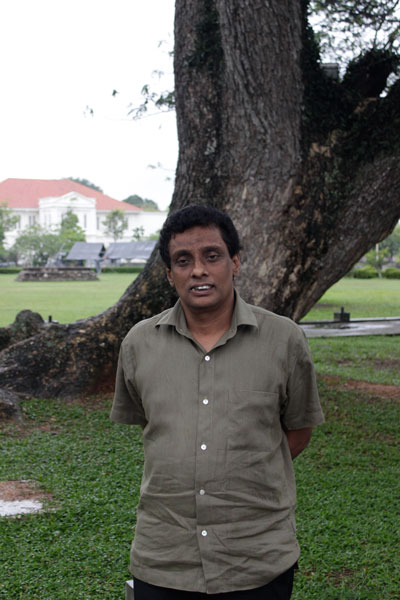
Prasanna Vithanage
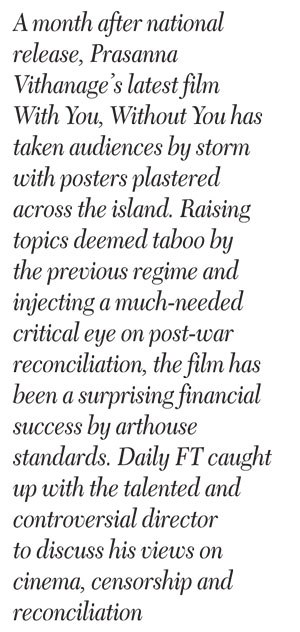 By Shiran Illanperuma
By Shiran Illanperuma
Q: The film finished production in 2012. Why the delay in a national release?
A: Every filmmaker in Sri Lanka, after completing their film, has to wait at least a year-and-a-half in a waiting queue to get a local release. But in this case it was prolonged for two reasons. Firstly I wanted to screen the film as audiences in other parts of the world have seen it – with proper sound and image quality. At the time we didn’t have digital projection facilities, not even in Colombo. So my producers and I thought that we should wait.
At the same time I was a bit reluctant to submit it to the local Censor Board during the previous regime because I knew their nationalistic view. They looked at everything through this prism of the ‘Mahinda Chinthana’. I think I was correct because when I submitted the film in 2014, they asked for a lot of dialogue and visuals to be cut. The release was postponed because I didn’t agree and my producers stood by me. If I had agreed you would not be seeing the same film screening in Sri Lanka today.
When the new Government came into power, on the next day, 9 January, I wrote a letter to the Censor Board requesting them to watch the film again with a fresh perspective. After watching the film the new Censor Board passed it and that’s how the film is screening in Sri Lanka today after three years.
Q: With the film passed, what do you think the views of the current regime and Censor Board are?
A: When I was recently in India a journalist asked me, in an auditorium full of people, “What is the censorship situation in Sri Lanka?” I said we have very liberal censorship. So everybody laughed. How could censorship be liberal?
At the moment the Censor Board has become liberal. But we have passed these phases before; when a new government sweeps in, there’s a honeymoon period. After that, when a filmmaker questions the social institutions in this country, the honeymoon ends and we see the true face of the Censor Board as a part of the regime that is in power.
This is why we filmmakers have requested a classification board like in any developed country. Censorship should not be politically motivated; there should be a classification board and a rating system – a guide for parents to understand whether films are suitable for their children or not. This should apply to all filmic materials shown on television as well.
We can see in the British Classification Board that the basis of classification is freely available on websites in the public domain. So the public knows that if a film is rated PG, it may be because of language or nudity, for example. We should educate people rather than curtailing free speech and thinking. What happened during the previous regime was that they wanted to make films for children. But finally what we have ended up with is a childish cinema!
Filmmakers should be able to freely portray human relationships and the country they are living in. This is what was blocked by the previous Government. A classification board is now the need of the hour. We have to change the current Public Performance Board Act through Parliament and make classification the national policy. Otherwise what will happen is the continuing cycle of honeymoon and then censorship.
Q: With You, Without You is your second adaptation of a Russian novel into a Sri Lankan context. What is the connection there?
A: I grew up with Russian literature during my school days, it was frequently translated into Sinhala and I used to read that. Even Martin Wickremasinghe, the greatest writer Sri Lanka has produced, has admitted the connection to Russian literature, comparing them to ‘Jathaka Katha’. We can relate to the emotions and spirituality of these texts by the likes of Dostoyevsky and Tolstoy.
For me, the attraction was concern about humans, human nature and humankind. This concern reflects in an emotional and moralistic manner. Similarly, the films I make – like With You, Without You – question morality and right and wrong. These themes attract me.
Q: How has the local audience responded to With You, Without You? Is the public ready to engage with its themes?
A: Many have doubted whether the film would ever be released in Sri Lanka. Some say I am raising questions about the aftermath of the war and reconciliation – or rather, non-reconciliation – and question whether Sri Lankans would like to see this and admit it.
But artists should be ahead of their people. They capture things that are undercurrent, that are not being thought. We bring what’s underneath, out into the public domain. This is the artist’s duty. Every good artist in the world, without thinking about awards and rewards does this. Sometimes people may not be ready to accept certain things, but when we look back we feel the artist was right. Artists should stay ahead of the times. If our minds and ideas age we become part of the hegemony, cease to be artists.
In Sri Lanka, I think everyone is tired of the war. Our generation is tired and we want to move forward. I’m happy that young people especially want to serve and be part of Sri Lanka. Unfortunately there is no real reconciliation process and if reconciliation doesn’t happen in Sri Lanka, I think there is no future for us. As a filmmaker I’m asking for more understanding. For me the film is tragic but really about love between these two polarised ethnic communities.
So I think in a nutshell: yes, people are ready to engage.
Q: Can you speak about the reasoning behind setting the film in the hill country?
A: I had heard stories that many parents in the war ravaged areas of the north, somehow took their children fearing LTTE conscription and the war and kept them in the hill country. Being the least war-affected area, it was sleepy and free of conflict, it was secure. Some of those fathers and mothers perished during the war and so their children stayed on. In fact I met a few boys who had integrated with the hill country Tamils and didn’t want to go back to their villages. Some were thinking of going to Tamil Nadu. All this happened when I was location scouting.
In filmmaking, most of the decisions are made intuitively, in Sinhala we say ‘iwa’. For me setting is vital, a filmmaker creates a world of his own, but that world should feel authentic. If you go to the film’s setting in Bogawantalawa, you may not see exactly what was in With You, Without You. That was created by me to bring out the world of these characters. So it’s like painting, you can only paint what your eyes see, but hopefully it gives audiences something they haven’t seen before.
Likewise in cinema, place and politics come out in the way you construct the world. So I chose to limit the setting to a pawnshop and what they see outside their windows. The scenery is not just a background but represents the psychology of the character at the time. Filmmakers control nature and the atmosphere to make the audience feel what’s happening inside the character. In literature you can describe emotions but in film you show it through setting. For example the use of the colour blue in the film helps to depict the emotional coldness of the characters.
Q: The lead actress Anjali Patil is Indian, why was a Sri Lankan Tamil not chosen for the role?
A: I originally didn’t want an Indian actress. I reached out to many Tamil girls taking part in acting and tele-dramas but I didn’t find the face I was looking for, with the right capacity for acting. Unfortunately it’s connected with the lack of a local Tamil film culture I mentioned earlier.
I did work with a young Tamil actress who was very talented – she had acted in a Sinhala film – but I feared she wouldn’t be able to deliver the latter conflict part of the film and portray the crisis of the character. So I opted for Anjali Patil, a girl from Maharashtra, who has acted in only one film before.
I do hope that in the future Tamil cinema will develop more and there will be more Tamil filmmakers and performers.
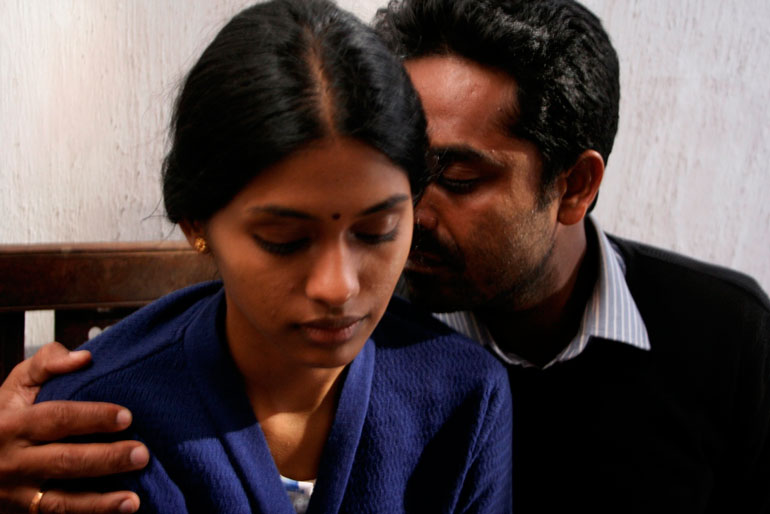
Q: You are one of the few Sri Lankan directors to incorporate both Tamil and Sinhala in your films. Could you elaborate on your motivations for that?
A: It was not a conscious decision in the beginning, it was simply my intuition. I have seen many Sinhala films where Tamil characters and Muslim characters are portrayed in a comical way, speaking broken Sinhala. The characters do not even speak Tamil amongst themselves! I believe these characters should be portrayed truthfully and realistically. Whether hero or villain, they should be given their proper space.
The first time I used Tamil was in August Sun. The Muslims speak in Tamil and not Sinhala because it would have been unrealistic otherwise. When I was making With You, Without You, I realised language is also political. In the first scene where the pawnbroker Sarasthri is in the hill country, he doesn’t speak to the Tamil customer in Tamil because he knows that she will understand. So he speaks in Sinhala but the girl responds in Tamil. That brings out the politics at play. Two characters in the film – the girl Selvi and the housemaid – speak to each other in Tamil. Sarasthri may understand but he doesn’t respond. So if I let these two characters speak in Sinhala for the benefit of the Sinhala audience, they wouldn’t have minded. But for me it’s heartbreaking and morally wrong to depict people like that.
Interestingly I should add here that what we cannot separate Sri Lankan cinema from diaspora cinema. We have a 2.5 million diaspora of Sinhalese, Tamils and Muslims. People like Pradeepan Raveendran from France and Lenin M. Sivam from Canada make great films and we should encompass them within Sri Lankan cinema and acknowledge that our people and culture have moved out of the island.
Coming back to the island, we cannot boast of a Sri Lankan cinema when we are making Sinhala only films. We can only say there is a Sinhala national cinema in Sri Lanka. Unfortunately the many attempts to make local Tamil cinema have been overpowered by Tamil Nadu masala cinema. Only a handful of Lankan Tamil films have been made and people have not patronised them. But I think after the war a greater number of Tamil youth from the north and east want to make a mark with their films. This is a very positive thing, because only with this can there be a dialogue between filmmakers from the north and south. Tamils films should be screened in the south and Sinhala films in the north. I believe that could lead to true understanding.
With today’s technology and internet platforms, this is easy to do as you don’t have to carry the physical copies around anymore. The Government should support filmmakers of the north and east and there should be a policy to proclaim a kind of bilingual Sri Lankan cinema. True reconciliation happens when you give a platform for the others to speak. We should be listeners.
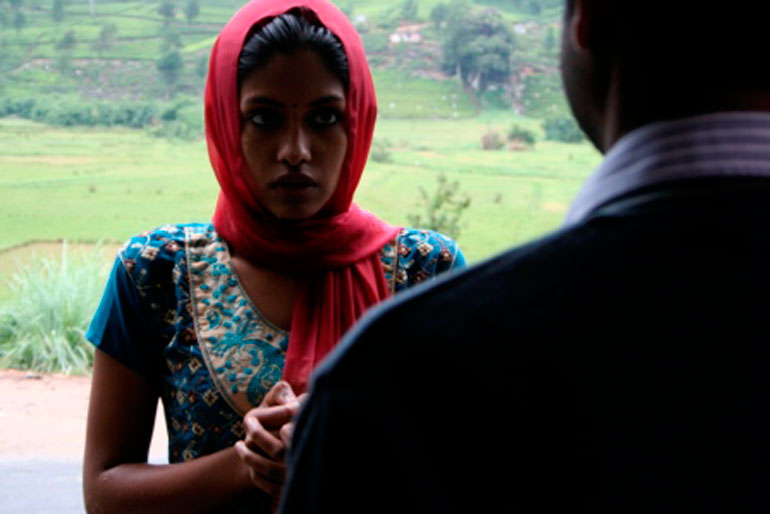
Q: Post-war, what do you hope for Sri Lankan cinema?
A: Cinema is connected with the political scenario of the country. For me reconciliation is about understanding the other from their point of view and coming to a middle ground. True reconciliation means equal rights, equal space and equal opportunity for every Sri Lankan.
Nationalistic historical epics were given full priority by the previous regime. They made these so-called historical films with a nationalistic agenda and that was the only stream of expression in Sinhala cinema. Everything else was suppressed. It just shows that filmmakers are not being honest. If ideology supersedes your characters then the filmmaker is trying to curry favour with the regime and get something for themselves or fan the flames of racial hatred. We should be concerned about the political and cultural ramifications of these types of films, because the outcome will not be seen now but in a future where Sri Lankans are further polarised.
It’s very easy to make people divided. The politicians in Sri Lanka have always been exponents of divide and rule. But it’s harder to make people understand each other so I think whatever the hardships; we need artists who see their destiny as being connected to the destiny of their people. It’s too easy for artists to make money through provocation; the artist’s duty is to make people see.
Ultimately I believe there should be true understanding among all the communities. If this doesn’t happen I don’t see a future for Sri Lanka, and of course that means no future for Sri Lankan cinema either.
